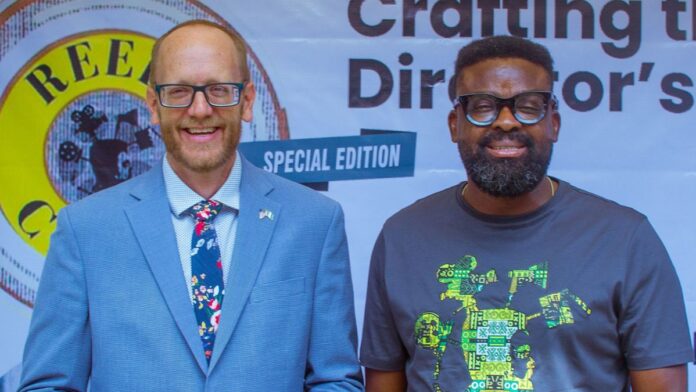Kunle Afolayan’s KAP Film and Television Academy has launched a four-day cinematography and directing workshop for emerging filmmakers in collaboration with the United States Embassy. The programme kicked off on Tuesday at KAP Hub in Ikeja, Lagos, featuring the third edition of the academy’s Reel Circle.
The event’s opening ceremony drew an array of notable attendees, including actress Sola Sobowale, veteran filmmaker Tunde Kelani, KAP Academy director Seun Soyinka, head of school Prof. Tunji Azeez, QEDNG publisher Olumide Iyanda and Cinemax Distribution Limited CEO Ope Ajayi.
Consul General at the US Consulate in Lagos Will Stevens was the special guest at the launch.
Award-winning American director Angel Williams and cinematographer Erin Wesley were also present.
Speaking at the event, Kunle Afolayan emphasised the importance of the workshop for aspiring filmmakers, sharing career insights through a video montage that highlighted significant moments in his filmmaking journey.
Mr Stevens, addressing the audience, praised the potential of Nigerian filmmakers and the influence of African storytelling. He said, “As an American diplomat, I feel deeply the power of our culture and how the United States has benefitted for many decades, from the power of culture and that has helped how people perceive the United States for better and for worse but it also led to increased interest in visiting and doing business in the United States.
“Kunle and some of his colleagues are churning out content that is being watched across the globe in partnership with the United States via platforms like Amazon, and Netflix, and they are investing because they know people want to hear these stories.
“I believe that we are at the very beginning of what I call the second half of the 21st which is the African century. By 2050, Nigeria will be the third-largest country in the world and second largest democracy in the world and Africa will have over a billion people.
“We have to get ready and you are doing that by shaping how people perceive your culture, country and content and I am just really glad that as the US mission, we can really support that and we can create this partnership with the American storytellers and film industry to tap into the next generation of people that are going to be here.”
The workshop also featured a special screening of Ija Ominira, a classic film by Kunle’s father, Adeyemi Afolayan. This was followed by a panel discussion themed “Crafting the Director’s Vision,” where Kunle, Williams, Wesley, and Tunde Kelani engaged in an interactive Q&A session.
Kunle highlighted the value of collaboration within film production, stating, “Film is a collaborative effort, so it’s not a case of individuality. Yes, the departmental heads would definitely have meetings. Sometimes I engage even the lower members directly, especially if I see they know what they are doing.
“If you don’t know what you are doing, I will refer you back to the head of the department. If you know what you are doing, I specifically say ‘Okay, bring that person to stand in.’
“Whenever we have reading with the actors, I bring some of my crew members to be there so that if we are making changes, they know why even before we get on set. In that spirit of collaboration, we can work and party every day.”
Cinematographer Wesley offered insights on managing creative differences on set, especially when a director’s request may seem challenging. She emphasized the importance of adaptability, saying, “We prepare thoroughly before each shoot, but I remain open to ideas from directors, even if I have doubts.” She added that she values a collaborative environment where directors feel comfortable suggesting ideas and that she approaches her work without ego, welcoming challenges and new perspectives.
Kelani shared his own experiences, noting, “I have worked with directors; sometimes you have to really study their personalities and see how you can work with them. It is a creative process, so you have to create an understanding between the two of you. I know directors who I suggest an idea to, and they say, ‘It doesn’t make sense.’ I may try suggesting the next day, but if I’m met with the same response, I would stop.”
Director Williams recounted a challenge from her first feature film, where staying true to her creative vision within budget constraints required on-the-spot adjustments. She shared a story about filming a family dinner scene that had to be quickly altered due to unintentional changes by the crew, resulting in her improvising by starting the scene after dinner.




